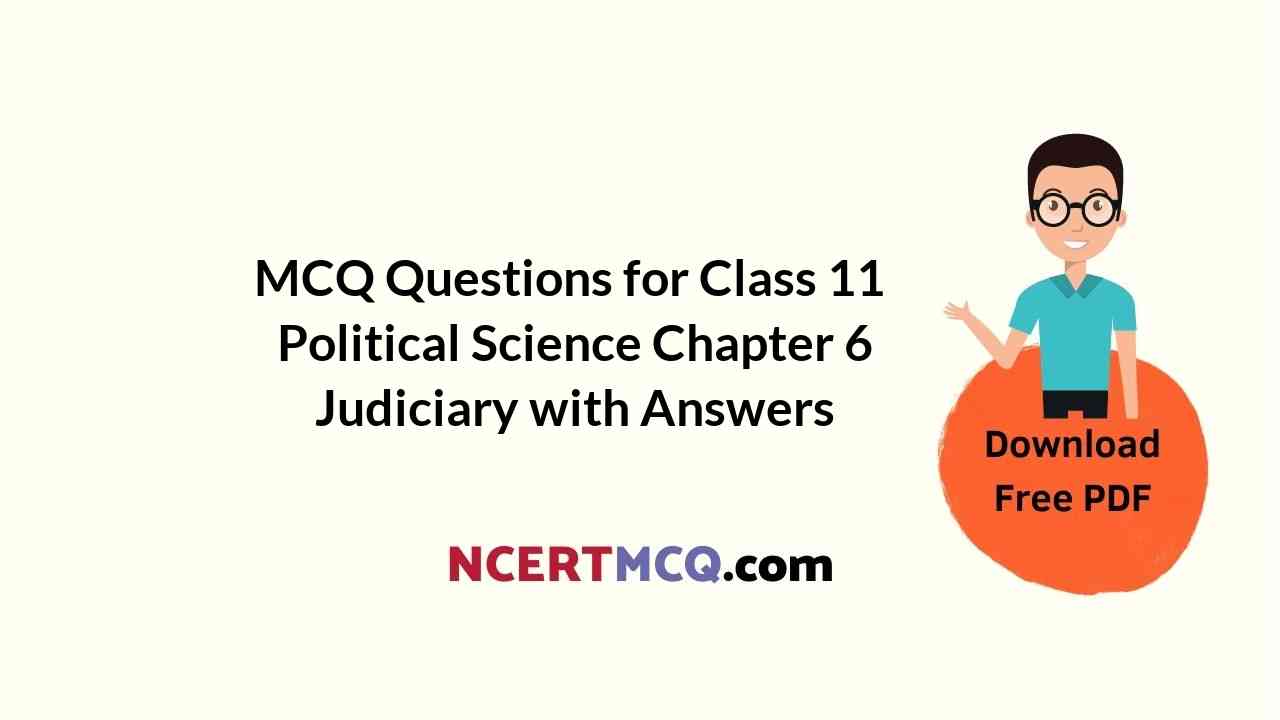Check the below Online Education NCERT MCQ Questions for Class 11 Political Science Chapter 6 Judiciary with Answers Pdf free download. MCQ Questions for Class 11 Political Science with Answers were prepared based on the latest exam pattern. We have provided Judiciary Class 11 Political Science MCQs Questions with Answers to help students understand the concept very well.
Class 11 Political Science Chapter 6 Judiciary MCQ With Answers
Political Science Class 11 Chapter 6 MCQs On Judiciary
Judiciary Class 11 MCQ Chapter 6 Question 1.
The executive plays a crucial role; the legislature has the powers of removal. This has ensured
(a) Balance of Power
(b) Judicial Interpretation
(c) Separation of Power
(d) Both balance of power and independence of the judiciary
Answer
Answer: (d) Both balance of power and independence of the judiciary
Judiciary MCQ Class 11 Chapter 6 Question 2.
In Golaknath vs the State of Punjab case, the Supreme Court was led by Chief Justice
(a) Suba Rao
(b) R. S. Pathak
(c) J. S. Verma
(d) R. C. Lahoti
Answer
Answer: (a) Suba Rao
MCQ On Judiciary Class 11 Chapter 6 Question 3.
The judges of the Supreme Court of India are appointed by the
(a) President
(b) Vice President
(c) Prime Minister
(d) Home Minister
Answer
Answer: (a) President
MCQ Of Judiciary Class 11 Chapter 6 Question 4.
By convention who is appointed as the chief justice of India?
(a) Senior-most judge of the High Court
(b) Junior-most judge of the Supreme Court
(c) Senior-most judge of the Supreme Court
(d) Senior Member of Law Commission
Answer
Answer: (c) Senior-most judge of the Supreme Court
MCQ Of Chapter Judiciary Class 11 Chapter 6 Question 5.
Supreme Court sits at:
(a) Chandigarh
(b) Delhi
(c) Kolkata
(d) Shimla
Answer
Answer: (b) Delhi
Class 11 Judiciary MCQ Chapter 6 Question 6.
The Judges of the Supreme Court of India retire at the age of:
(a) 62 years
(b) 65 years
(c) 60 years
(d) 50 years
Answer
Answer: (b) 65 years
Class 11 Political Science Chapter 6 MCQ Question 7.
The salaries and allowances of the judges are determined by
(a) Parliament
(b) Executive
(c) Judiciary
(d) President
Answer
Answer: (a) Parliament
Class 11 Political Science Judiciary MCQ Question 8.
Under which Article High Courts also have the power to issue writs?
(a) Article 32
(b) Article 13
(c) Article 226
(d) Article 356
Answer
Answer: (c) Article 226
MCQ Questions For Class 11 Political Science Chapter 6 Question 9.
What is the maximum number of judges of the Supreme Court of India including the Chief Justice?
(a) 20
(b) 21
(c) 26
(d) 34
Answer
Answer: (d) 34
MCQs Of Judiciary Class 11 Chapter 6 Question 10.
Supreme Court consists of one Chief Justice and:
(a) 13 other Judges
(b) 25 other Judges
(c) 20 other Judges
(d) 30 other Judges
Answer
Answer: (d) 30 other Judges
Class 11 Political Science Chapter 6 Judiciary MCQ Question 11.
The number of Judges of the Supreme Court is fixed by:
(a) Parliament
(b) Prime Minister
(c) President
(d) Cabinet
Answer
Answer: (a) Parliament
Question 12.
Who defined the functions and responsibilities of the Supreme Court?
(a) Law of the land
(b) Supreme court
(c) Supreme court tribunal
(d) Constitution
Answer
Answer: (d) Constitution
We hope the given NCERT MCQ Questions for Class 11 Political Science Chapter 6 Judiciary with Answers Pdf free download will help you. If you have any queries regarding CBSE Class 11 Political Science Judiciary MCQs Multiple Choice Questions with Answers, drop a comment below and we will get back to you soon.
Class 11 Political Science with Answers MCQ:
- Constitution: Why and How? Class 11 MCQ
- Rights and Duties in the Indian Constitution Class 11 MCQ
- Election and Representation Class 11 MCQ
- Executive Class 11 MCQ
- Legislature Class 11 MCQ
- Judiciary Class 11 MCQ
- Federalism Class 11 MCQ
- Local Governments Class 11 MCQ
- Constitution as a Living Document Class 11 MCQ
- The Philosophy of the Constitution Class 11 MCQ
